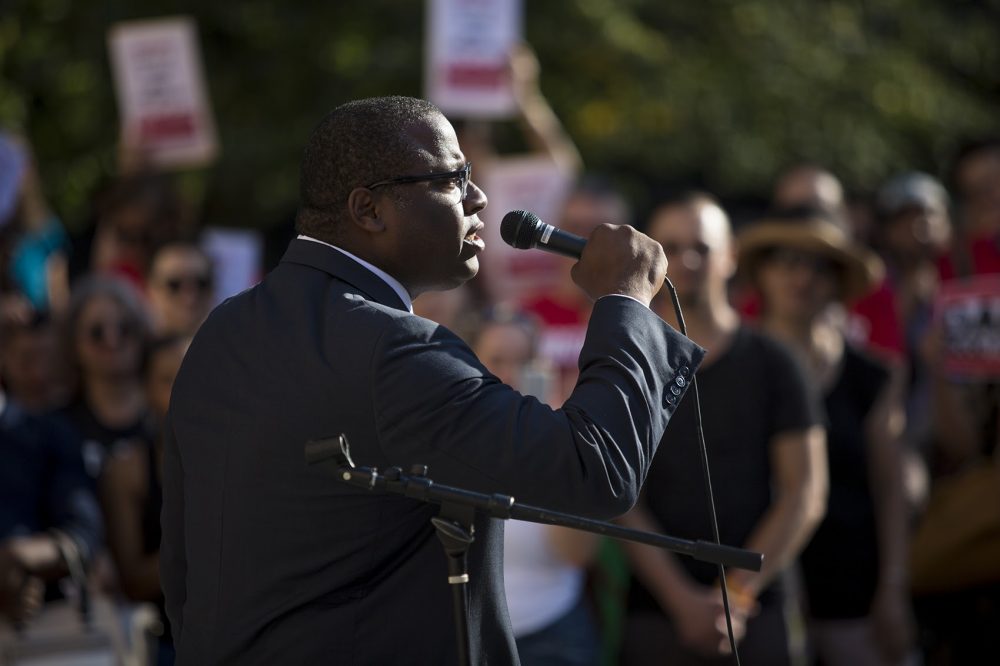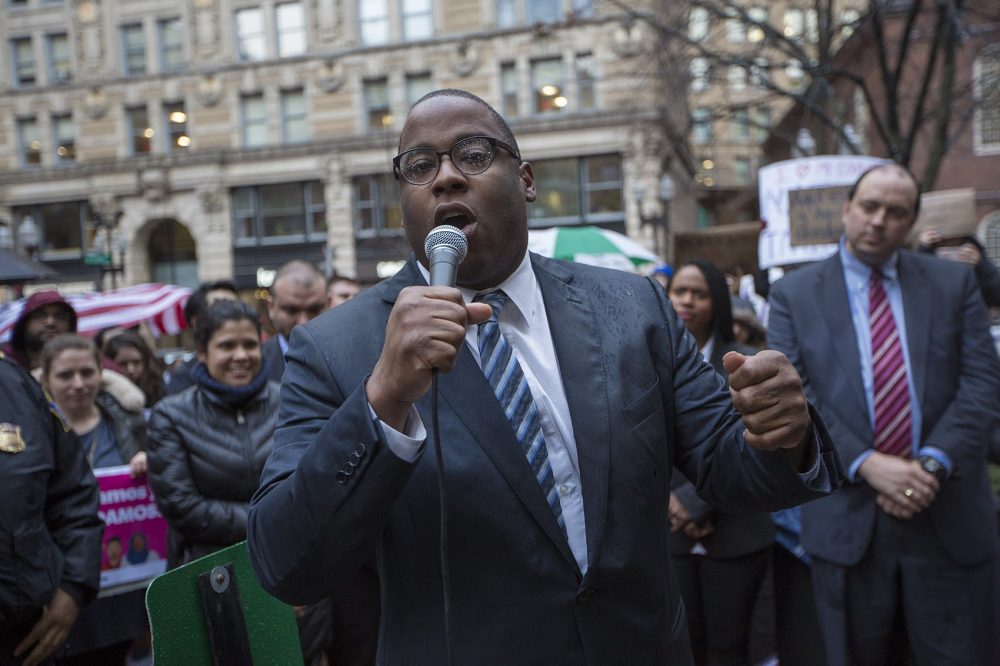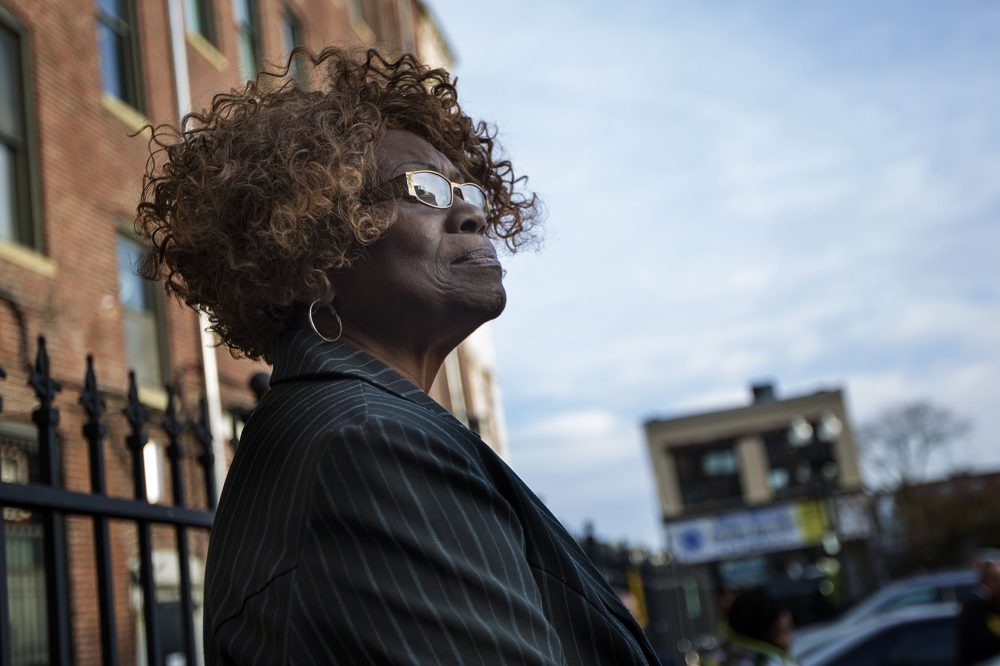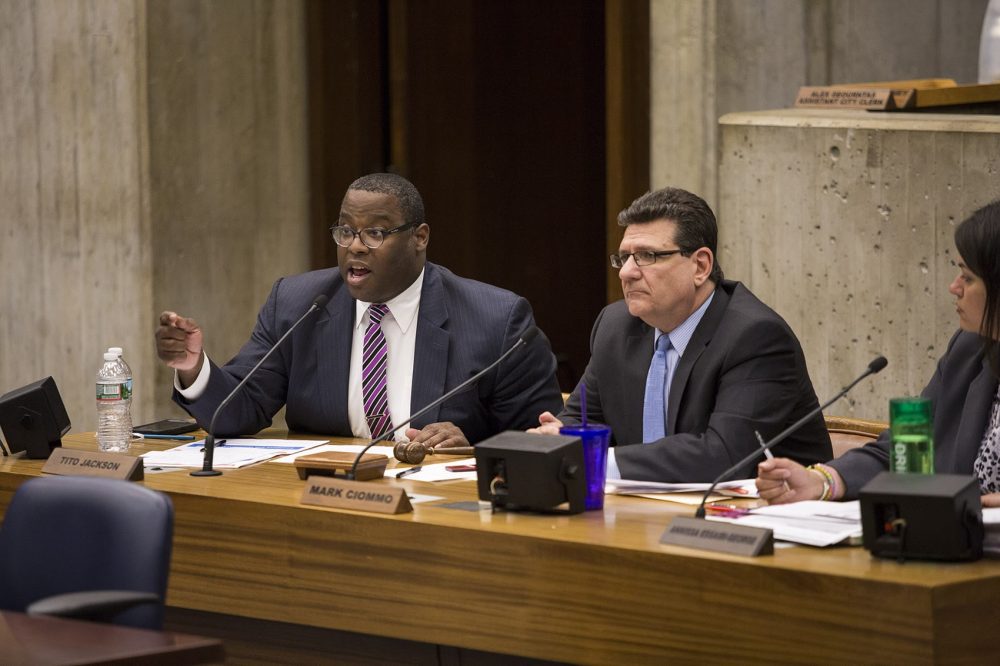Advertisement
Tito Jackson Aims To Be Boston's First Black Mayor
Resume
Following Tuesday night's preliminary election, Boston City Councilor Tito Jackson will be on the ballot next November in his bid to unseat Boston Mayor Marty Walsh.
Jackson, who lives in Roxbury, is the first African-American mayoral finalist since Mel King ran unsuccessfully against Ray Flynn in 1983.
At 6-foot-2 and 200-plus pounds with a ready smile, Jackson still cuts the figure of the high school football player he once was. But the city councilor is running hard — not to win football games, but to bring change to Boston and make it work for all of its residents.
“I want people to be able to still live in this neighborhood," Jackson said on a recent morning greeting passersby in Roxbury, "not get pushed out of the neighborhood and community that they built up and made safe."
In 1991, when Jackson was 15, there were 151 murders in Boston, many of them in Roxbury, where he grew up. But the community came together with clergy, City Hall and police, and now Roxbury is a very different place.
"Two hundred dollar increases in rent,” he said. “There are developers who are buying whole buildings and emptying them out and not realizing those are people. Those are families. Same thing in South Boston. Same thing in East Boston. They're getting pushed out there too.”
Jackson complains about a city with a booming economy and enormous wealth, but with the widest wealth gap in the nation, and dramatic racial disparities.

He inherited his progressive politics from his parents, Rosa and Herb Jackson. Herb was a community activist, who sponsored registration drives to help elect candidates of color in Boston, and pressured city construction companies to hire local and minority workers.
Tito Jackson describes his dad as a major force in his life.
"When you're a young person you always think, 'No, I'm not going to be just like my dad.' You know what? I am my dad,” Jackson said. “He fought every single day for the uplift of everybody in Boston. What he instilled in me, and my mom instilled in me, is that we're not doing great as a city if we leave significant portions of people behind."
Herb Jackson died in 2002, but Rosa Jackson remains a big presence in Tito Jackson’s life. She lives in Jacksonville, Florida (“where Jacksons go to retire,” according to the mayoral candidate), but these days she is back in Boston to help with her son’s campaign. Rosa and Herb Jackson had eight kids, four of them — including Tito — were adopted, a fact Rosa Jackson urged her young son to talk about for a school project.
"So we put together a little book for him with pictures of him at different ages, and I helped him present it,” she recalled. “All the kids in that class were so excited: 'Tito was adopted? I want to be adopted, too’ — because we told them that Tito was special. He was chosen to be in the Jackson family."

So Jackson grew up knowing he was adopted, but not until he was a young man did he learn something about this birth mother.
“My biological mother was 13 years old and she was assaulted by two guys. And that's how I got here," Jackson said. “I want to meet her someday, and I just want to say ‘Thank you.’ ”
Jackson says learning about the difficult circumstances that led to his birth has shaped some of the causes that he cares most about.
"One of the most important parts of the work that I do is redefining manhood; redefining it as anti-sexual violence and anti-domestic violence — to say, 'We can love each other.' "
Jackson learned about his birth mother when he was in college, which he says provided a pivotal opportunity. He had hoped to go to Morehouse, the historically black college in Atlanta, but didn't receive enough financial aid. So he ended up at the overwhelmingly white University of New Hampshire.
His first day on campus, "we went to where all of the freshmen were meeting, and I'm talking to someone, so I back into the room,” Jackson recalled. “I turn around and I don't see another black face in the whole place. And I view it as one of the most important moments of my life."
Jackson says he considered running back to Boston. But he stayed because he wanted to help future minority students not to feel as alone and unsupported as he did that first day. So he began to organize.
"We started an organization called the Black Student Union,” Jackson said with an exaggerated gravity. “And why do I say it loud? Because it's the biggest and loudest name that we could have for seven people!"
On a campus of 12,000 students, fewer than 100 were black, so the group, led by Jackson, demanded that UNH diversify its student body, and staged a sit-in to press their case. Jackson eventually ran for student body president and won.
"His agenda was not geared toward African-Americans, but it was geared toward everybody,” recalled Malik Azziz, a longtime friend of Jackson's who was also a fellow member of the Black Student Union at UNH.
Azziz says Jackson was blessed with natural political skills, which made him something of a celebrity on campus, and that his campaign for student body president transcended race.
"If there were a roomful of 2-foot-tall people, Tito would fit right in, and their issues would be his issues,” Azziz said. “He didn't limit himself by his race, which is a beautiful thing. It created an energy that made him pretty much an unstoppable force, and somebody that you wanted to know."

Jackson tried to exploit that political talent in 2009, during his first run for the Boston City Council, when he ran for an at-large seat. Stephanie Anderson Garrett managed the campaign, and recalls that Jackson worked hard to reach out to voters well beyond his political base in Roxbury.
"He was determined to show up in places like South Boston and Carson Beach,” she said. “A lot of the black and Latino supporters that were part of that campaign ... had never been there. Time and time again, [Jackson] was committed to showing up and connecting with every part of the city."
Jackson lost that race, but two years later won the District 7 seat, representing Roxbury, parts of Dorchester, the Fenway and the South End.
Now, Jackson faces his biggest political challenge yet: to convince the voters of Boston that he can represent — and lead — the entire city.
"All of that said, Boston is the greatest city in the world,” Jackson proclaims. “But the question is, are we great for everyone?"
This segment aired on September 28, 2017.
